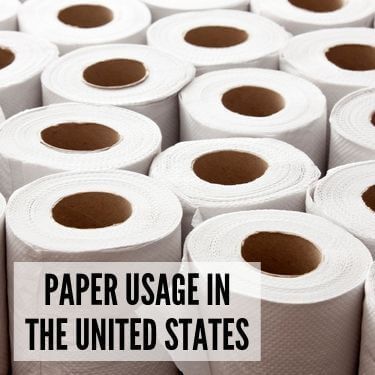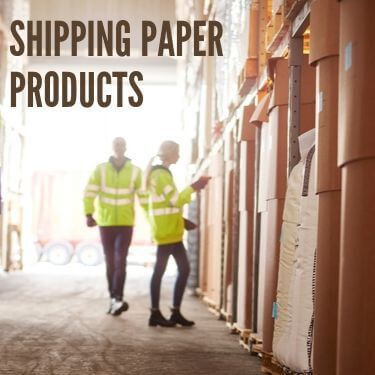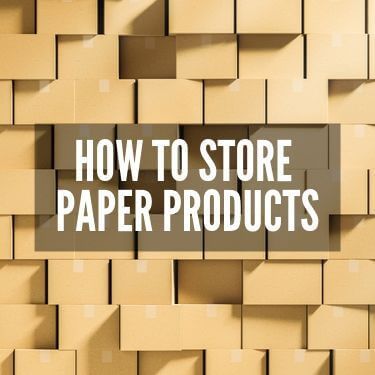The United States produces mass amounts of paper and paper products every year, with one of the largest manufacturers being Georgia-Pacific paper. Paper products are used more frequently than one may think, for example, the Dixie To Go Cup you pour your coffee into every morning or the paper plates you eat your dinner on. With the U.S. depending on the production and distribution of paper it is imperative paper products are handled and shipped carefully.
Hauling and storing paper products can be quite a task. Due to the environmental impact, paper mills face a considerable amount of scrutiny, but companies like Georgia-Pacific paper follow the rules and regulations of the Sustainable Forest Initiatives (SFI) to decrease some of the backlash that comes with producing paper. The United States has had a significant increase in the amount of paper that we use, but there are many complications with transporting it. Having a qualified logistics team can help you along the way.
Between the wide array of paper products manufactured in the U.S., each individual person uses an estimated 195 pounds of paper-based merchandise every year. That’s equal to the weight of 3,900 AA batteries… in paper. Nonetheless, the use of paper and paper products is on the rise. So far in 2019, roughly 219 million people have used paper cups or plates, and by 2023 that number is projected to increase to 225.89 million people.
Examples of consumer products are:

Although we live in a digitally advanced world, it is impossible to go completely paperless. Paper aids our lives in so many fashions. It enhances communication, travel, packaging, and honestly, what would we do without toilet paper?
Georgia is home to a number of leading paper industries in the world, including International Paper and Georgia-Pacific. In 2018, the state ranked first in the entire country in paper manufacturing exports. Paper mills have a prominent industry in Georgia because of the proximity of the southern pine forest. It is imperative that the location of the paper mill is within a reasonable distance to a forest.
The wood weighs significantly less when it is broken down to pulp compared to the timber itself, which would make for high transportation costs. Having the manufacturer close helps to eliminate these unnecessary expenditures. The beams of wood have a much smaller profit margin than the pulp, the pulp is 13 times more valuable.

The wood used to make pulp for paper and paper products comes from some of these trees:
Once the wood is collected, it is brought back to a mill to be broken down. Wood chips or recycled paper is used in addition to a mixture of chemicals to create pulp, the finished product can be bleached or unbleached depending on what it’s being used for.
Georgia has two large advantages in the paper industry, one being the abundance of supplies (22 million acres of woodland) and two the experience the state has in the growth of world-class mills. As they lead the U.S. in paper manufacturing, Georgia has roughly 270 paper mills/manufacturers. A few of the top-performing are:
Georgia continues to dominate in all things paper year after year. How do they do it? Well, the replenishment of their supplies is exceedingly important, and the state truly values the trees, especially the southern pine forest.
Although the manufacturers and mills have a high demand for wood, the people on this earth need trees to survive. In order to overcome both of these challenges, Georgia aims to restore every piece of wood they remove.
Water is also a material that is constantly used in the paper-making process. Many of the manufacturers and paper mills reuse water or pull it from nearby rivers and wells to decrease the high consumption rate. Learning how to manipulate some of these obstacles has put Georgia on the top of the charts and they will continue to hold that spot.
Need help with freight shipping from Georgia? See how an expert freight partner can help.
Around the world, we use a variety of paper products daily, often more than once a day. In fact, North America’s paper consumption is expected to exceed the paper-making industry in the future.
Paper products can take on many different shapes and forms. Georgia-Pacific specializes in several of your favorite brands:
How many times have you used one of these items for an occasion and not even realize that you were using paper? I’m sure more times than you can probably count. 42 percent of Georgia’s overall paper distribution comes from items like the ones listed above.
Georgia-Pacific also specializes in “GP Pro” products, if you have ever been in a public restroom, you have seen them and probably even used them. The enMotion paper towel dispensers in the restroom, the machines you wave your hand in front of and it automatically shoots out a paper towel, those are manufactured by this company. In addition, they also specialize in building products and related chemicals.
When distributing something like paper, you need an experienced logistics team to help you make the move. For most companies, it is important to have a dependable carrier to avoid any damage to your products. However, with paper extra precautions should be taken. One drop of water could ruin an entire pallet of paper products.
Paper is shipped with… you guessed it, paper and lots of cardboard as well. Since most items that contain paper can’t get wet, many manufacturers take the final step of wrapping items in plastic before putting it in a truck to be shipped off.
Products like newspapers that are not wrapped in plastic are bundled to limit the chance of damage. The items are then placed in a truck, usually in a less than truckload (LTL), to reach its destination. Paper is usually bulkier but lightweight so it can’t be placed in a large load or with any heavy products. Paper can still be transported by air, ocean, or rail as well.

In 2018, the United States exported 16.4 billion dollars worth of paper. To ship papers internationally, only the basic export documents are required:
Unfortunately, there are a multitude of challenges facing the paper industry today. Issues such as space, density and weight are something that every manufacturer must consider before shipping off their product.
Density is one of the largest problems. Office paper is extremely heavy and dense, if you’re doing via LTL this product will be high dollar. However, a product like toilet paper is more lightweight but more vulnerable to damage. The price to deliver paper goods may fluctuate based on the product.
Using an effective logistics team can save money for you and your business. With lightweight loads, there is a possibility of damage but paying close attention to how you package your product and who you hand it off to can save valuable time.
Another evolving issue lies with the heavier loads. All transportation units have a weight limit. Many trucks carrying items like office paper hit their weight limit rather quickly.
Trucks are pulling off the lots with half-full trailers because they are not legally allowed to haul anymore. The paper industry continues to battle with this growing concern of sending out two half-loaded trucks when one could easily squeeze the same amount of products. Not only is this less efficient for the company but it costs quite a bit of money as well.
Manufacturers, like International Paper, have asked that legislators consider changing the weight allotted on trucks to a per-state basis, decreasing the amount of money wasted on transportation. While this can be more dangerous for drivers, International Paper stated they would add another axel to assure safety measures are met.
If you're shipping large amounts of paper, you may have extremely heavy shipments that qualify as oversized. In these situations, you need a trustworthy heavy haul shipping company. R+L Global Logistics partners with numerous high quality, vetted carriers. This allows to quickly secure affordable heavy haul trucking rates while saving you time in the process.
To keep paper from crumbling, wilting, folding, or getting wet it is important to store it properly. With hard work from both the manufacturer and the carrier, the paper can avoid harsh exposure to anything that may damage it.

Each paper product has a different moisture level that must be maintained depending on the product's use. Although most paper feels dry, it's not actually dry. Printing paper must maintain slight moisture or all the paper would stick together jamming the machine. At the same time, items like baby wipes must maintain a high level of moisture or they will get dried out ruining the potential of the product.
While paper is not transported in a humidity-controlled environment, it is crucial to have a moisture-controlled storing area. Humidifiers or dehumidifiers are recommended to keep moisture levels around 35-55. Some warehouses even use misters to keep the quality of the product.
Temperature is not as important as humidity, but it’s still a significant part of the storing process. Although it’s recommended to keep paper stored at 68 to 75 degrees, the rule of thumb is to allow paper at least 24 hours to adjust to the temperature it’s being stored in.
If paper is stored in a warehouse at 70 degrees, then moves to an office with a temperature of 75 degrees, it should go through a 24 hour acclimation period. If these rules are not followed, the quality of the paper begins to diminish. The same rules are applied to paper products.
Manufacturers apply plastic packaging to their products to lock out any moisture and to save the items from any kind of damage. When storing a product, it is critical to preserve the packaging. Carefully store the items in warehouses making sure there are no sharp edges that could tear the plastic open.
At the same time, it is equally important to always control the storing temps to keep the packaging intact. If a warehouse is closing for the weekend or holiday, the temperature must be retained.
It is best to keep paper and paper products lying flat. This will prevent any cracking, bending or the possibility of the pallet collapsing.
The weight of the products needs to be considered. Indentions can start to form on office paper if too many are stacked on one another increasing the weight. Toilet paper and tissue paper can be stacked on one another because they are lightweight, however, the boxes are more susceptible to damage.
Following these four procedures can eliminate any possible impacts to the product. Relying on a responsible carrier that also has warehousing options helps avoid multiple hands on your items which can increase the danger potential.
As you can imagine, the paper industry receives backlash for constantly harming the environment. Thousands of trees are removed daily for the manufacturing of paper products. Due to the criticism, sustainability has become an essential part of the paper-making process.
Most paper mills have adopted a sustainable system to work by. For example, Georgia-Pacific’s sustainable process involves Sustainable Forest Initiatives (SFI), managing the environment and managing its resources.
The state of Georgia has a higher renewal versus removal rate of trees, this is another reason why Georgia is home to an abundance of paper mills. The SFI is an industry who monitors the sustainability of more than 360 million acres of the forest. Companies can get many certifications to ensure they are following the SFI code of conduct. Georgia-Pacific has several certifications:
The SFI uses these certifications as guidelines making certain manufacturers harvesting wood are doing it the appropriate and environmentally friendly way.
Paper mills work hard to decrease the carbon footprint. Energy consumption is extremely high for these manufacturers but they aim to use renewable resources to power their facilities. Georgia-Pacific’s most used energy source is biomass accounting for almost 60 percent of its energy consumption.
It’s extremely difficult to eliminate paper in our world, especially in places like a hospital where sanitariness is a necessity. However, paper distributors like Georgia-Pacific are doing its best to decrease the amount of waste in landfills.
One of the most efficient ways to do this is through recycling. Georgia-Pacific’s affiliate company, GP Harmon Recycling, recovers more than 5 million tons of paper every year. The recycled paper is sent off to be made into toilet paper or sold off to other manufacturers. GP Harmon also collects non-paper items like plastic and aluminum for repurposing projects.
The company has also launched an environmentally-friendly toilet paper called Aria to turn recycled paper into something useful. Georgia-Pacific also strives to keep a goal of reducing waste with its enMotion paper towel dispensers. The machine only allows a short paper towel to come out in hopes to reduce the amount of paper towels people use in public restrooms.
Shipping paper products can be overwhelming if you don’t have a trusted carrier or warehousing team you trust. A logistics company that knows all the proper ways to store and care for your paper products is key for your profits. R+L Global Logistics can transport your products from Georgia to wherever your destination may be.
No matter whether you're shipping paper products from Georgia to Florida or across the country from Georgia to California, R+L Global Logistics is prepared to be your strategic partner.
We have over 30 years of logistics experience and dedicated customer service professionals. Give us a call today at (866) 353-7178 to find out more about our competitive rates and on-time deliveries. We understand why it’s imperative to keep your Georgia-Pacific paper products or any product in the same condition they were received in and will make certain to ship your paper products with special care through the entire supply chain process.
R+L Global Logistics
315 NE 14th St., Ocala, FL 34470